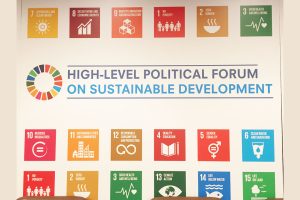9 July 2019: The first in-depth review of progress toward SDG 4 (quality education) took place on the opening day of the 2019 HLPF session. UNICEF head Henrietta Fore said no country can afford to have one in every three children out of school, as is currently the case in low- and lower-middle-income countries. She called for investing in what works, such as girls’ education, early childhood interventions, and reaching those left behind, such as children living through conflicts, refugees and migrants, and rural settings or urban slums.
As reported by the Earth Negotiations Bulletin, lead discussant Susan Hopgood, Education International, said the world is “severely off track” to achieve SDG 4. Shashwat Sapkota, UN Department of Economic and Social Affairs (DESA), described a “global learning crisis,” with a low proficiency rate among schoolchildren in reading and mathematics despite increased enrollment rates, particularly in Sub-Saharan Africa.
Hopgood suggested supporting teachers, a message echoed by panelist Kazuhiro Yoshida, Co-Chair, SDG-Education 2030 Steering Committee, who called for a system of support for teachers to create an enabling environment for learning. Morocco reported that all public school teachers in her country have secure public service contracts.
Hopgood also stressed the need to recognize education as a public good, not a commodity. Otherwise, we can never achieve equitable systems, she explained. Similarly, another lead discussant Madeleine Zúñiga, Global Campaign for Education, cautioned that private education may further exacerbate inequality, and she stressed the importance of addressing diversity to increase the quality of education.
Panelist John McLaughlin, Deputy Minister, Education and Early Childhood Development, Canada, identified gender as a central focus for education. Sweden highlighted the importance of education to advance gender equality and reduce gender violence.
Persons with Disabilities called for system changes, such as universal design approaches, that facilitate access to education. Lesbian, Gay, Bisexual, Transsexual and Intersex stakeholders stressed the importance of lifelong learning and a commitment to local and indigenous languages for inclusive learning environments. Indigenous Peoples said culturally sensitive information should be included in core curricula of schools. Children and Youth called for education that enables adaptation to climate change.
Among other input from Member States, Argentina reported on the Group of Friends for Education and Lifelong Learning, launched by Permanent Representatives to the UN on the International Day of Education on 24 January 2019, to advocate for achieving SDG 4 globally. The Republic of Korea observed that SDG 4 does not receive the attention it deserves at UN Headquarters. The EU mentioned the role of the aid effectiveness principles in advancing progress on SDG 4.
Countries also linked education to the achievement of other SDGs. Algeria highlighted the importance of SDG 4 to achieving SDG 2 (zero hunger) and SDG 3 (good health and well-being), while Mexico highlighted the importance of vocational training for achieving SDG 8 (decent work and economic growth).
The July 2019 session of the HLPF will also hold in-depth reviews of progress on SDG 8, SDG 10 (reduced inequalities), SDG 13 (climate action), SDG 16 (peace, justice and strong institutions), and SDG 17 (partnerships for the Goals). [SDG Knowledge Hub Sources] [IISD Meeting Coverage]

